Human Resource Management: Leadership Competence Report
VerifiedAdded on 2022/09/18
|5
|974
|23
Report
AI Summary
This report delves into the critical aspects of leadership within human resource management. It begins by outlining the essential competence profile of a leader, emphasizing the importance of social intelligence, interpersonal skills, and courage. The report then explores the relationship between leadership empathy and emotional intelligence, highlighting how leaders can understand and manage their emotions, as well as the emotions of others, to foster a positive and productive work environment. It discusses the two types of empathy: emotional and cognitive. Finally, the report concludes that leaders with high emotional intelligence are better equipped to manage resources and guide employees effectively. This report provides a comprehensive overview of leadership attributes crucial for organizational success. The references used are also provided at the end of the report.
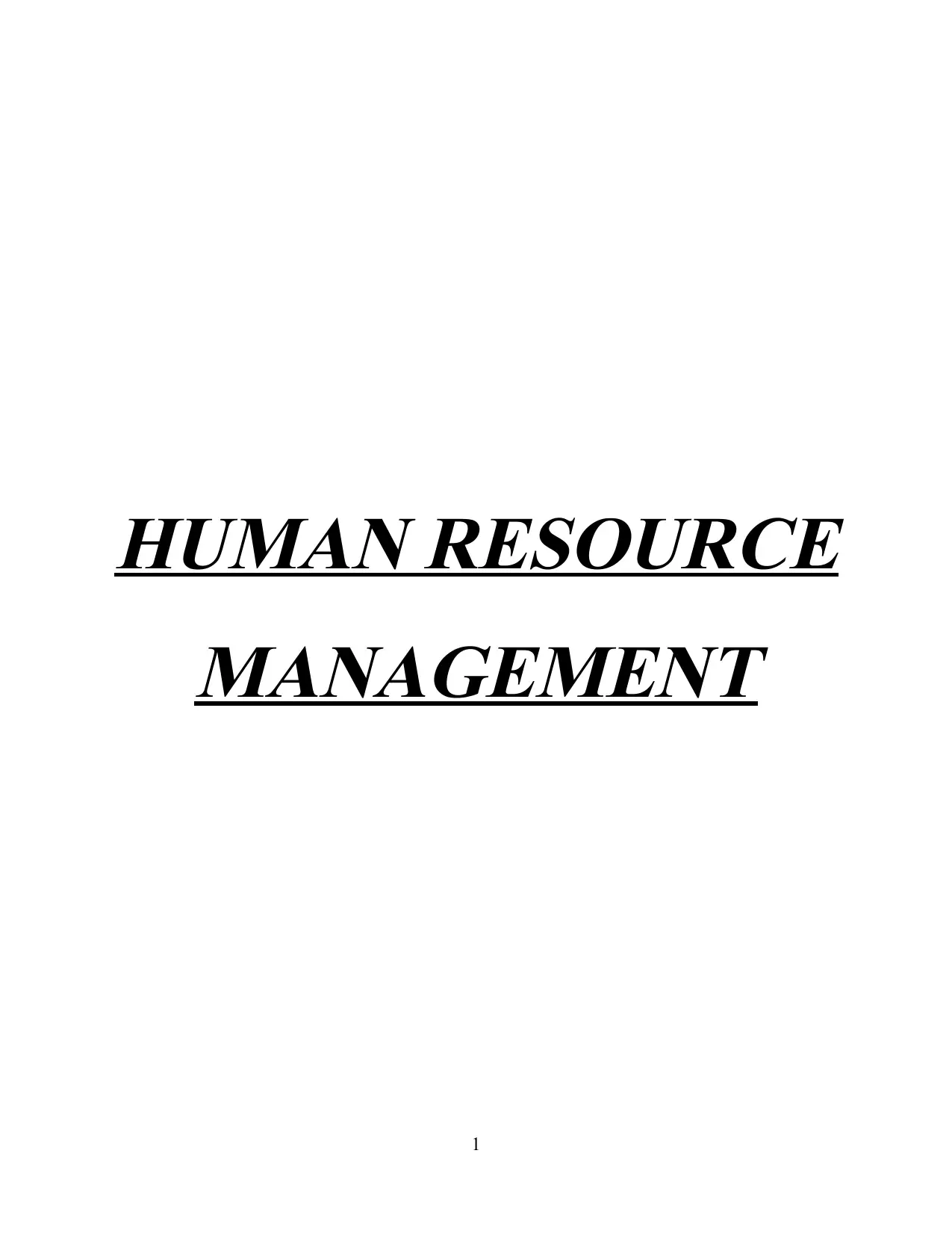
HUMAN RESOURCE
MANAGEMENT
1
MANAGEMENT
1
Paraphrase This Document
Need a fresh take? Get an instant paraphrase of this document with our AI Paraphraser
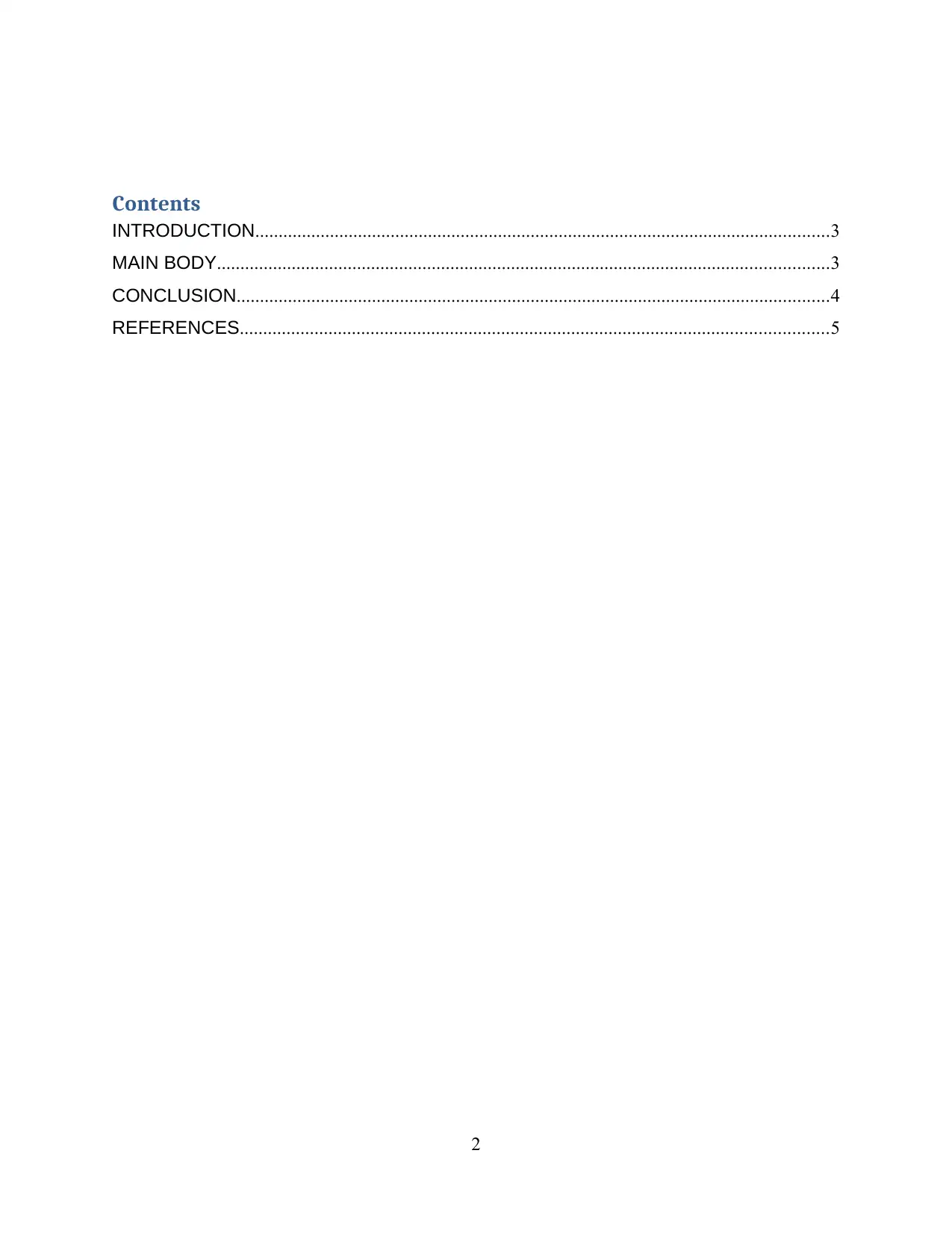
Contents
INTRODUCTION...........................................................................................................................3
MAIN BODY...................................................................................................................................3
CONCLUSION...............................................................................................................................4
REFERENCES..............................................................................................................................5
2
INTRODUCTION...........................................................................................................................3
MAIN BODY...................................................................................................................................3
CONCLUSION...............................................................................................................................4
REFERENCES..............................................................................................................................5
2
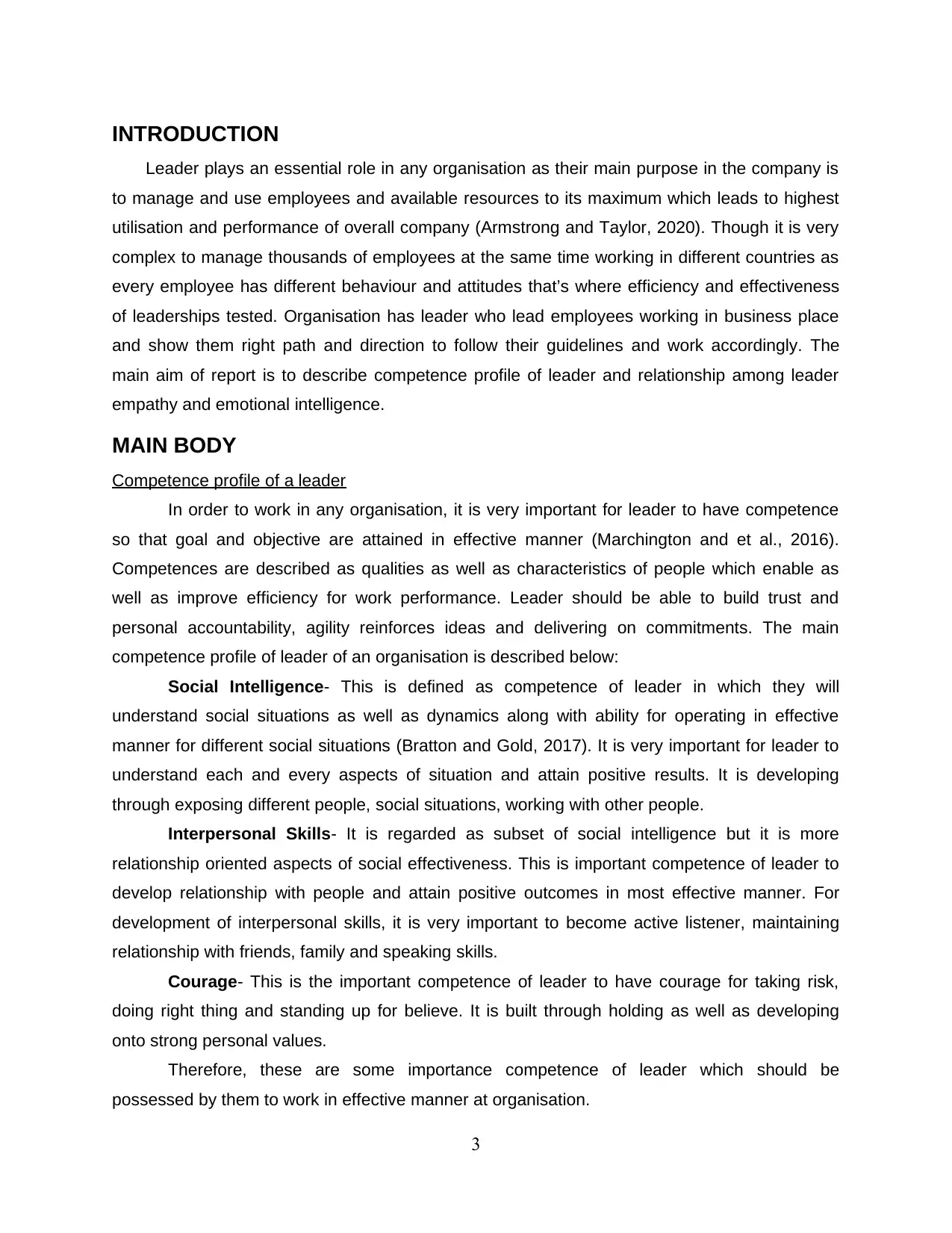
INTRODUCTION
Leader plays an essential role in any organisation as their main purpose in the company is
to manage and use employees and available resources to its maximum which leads to highest
utilisation and performance of overall company (Armstrong and Taylor, 2020). Though it is very
complex to manage thousands of employees at the same time working in different countries as
every employee has different behaviour and attitudes that’s where efficiency and effectiveness
of leaderships tested. Organisation has leader who lead employees working in business place
and show them right path and direction to follow their guidelines and work accordingly. The
main aim of report is to describe competence profile of leader and relationship among leader
empathy and emotional intelligence.
MAIN BODY
Competence profile of a leader
In order to work in any organisation, it is very important for leader to have competence
so that goal and objective are attained in effective manner (Marchington and et al., 2016).
Competences are described as qualities as well as characteristics of people which enable as
well as improve efficiency for work performance. Leader should be able to build trust and
personal accountability, agility reinforces ideas and delivering on commitments. The main
competence profile of leader of an organisation is described below:
Social Intelligence- This is defined as competence of leader in which they will
understand social situations as well as dynamics along with ability for operating in effective
manner for different social situations (Bratton and Gold, 2017). It is very important for leader to
understand each and every aspects of situation and attain positive results. It is developing
through exposing different people, social situations, working with other people.
Interpersonal Skills- It is regarded as subset of social intelligence but it is more
relationship oriented aspects of social effectiveness. This is important competence of leader to
develop relationship with people and attain positive outcomes in most effective manner. For
development of interpersonal skills, it is very important to become active listener, maintaining
relationship with friends, family and speaking skills.
Courage- This is the important competence of leader to have courage for taking risk,
doing right thing and standing up for believe. It is built through holding as well as developing
onto strong personal values.
Therefore, these are some importance competence of leader which should be
possessed by them to work in effective manner at organisation.
3
Leader plays an essential role in any organisation as their main purpose in the company is
to manage and use employees and available resources to its maximum which leads to highest
utilisation and performance of overall company (Armstrong and Taylor, 2020). Though it is very
complex to manage thousands of employees at the same time working in different countries as
every employee has different behaviour and attitudes that’s where efficiency and effectiveness
of leaderships tested. Organisation has leader who lead employees working in business place
and show them right path and direction to follow their guidelines and work accordingly. The
main aim of report is to describe competence profile of leader and relationship among leader
empathy and emotional intelligence.
MAIN BODY
Competence profile of a leader
In order to work in any organisation, it is very important for leader to have competence
so that goal and objective are attained in effective manner (Marchington and et al., 2016).
Competences are described as qualities as well as characteristics of people which enable as
well as improve efficiency for work performance. Leader should be able to build trust and
personal accountability, agility reinforces ideas and delivering on commitments. The main
competence profile of leader of an organisation is described below:
Social Intelligence- This is defined as competence of leader in which they will
understand social situations as well as dynamics along with ability for operating in effective
manner for different social situations (Bratton and Gold, 2017). It is very important for leader to
understand each and every aspects of situation and attain positive results. It is developing
through exposing different people, social situations, working with other people.
Interpersonal Skills- It is regarded as subset of social intelligence but it is more
relationship oriented aspects of social effectiveness. This is important competence of leader to
develop relationship with people and attain positive outcomes in most effective manner. For
development of interpersonal skills, it is very important to become active listener, maintaining
relationship with friends, family and speaking skills.
Courage- This is the important competence of leader to have courage for taking risk,
doing right thing and standing up for believe. It is built through holding as well as developing
onto strong personal values.
Therefore, these are some importance competence of leader which should be
possessed by them to work in effective manner at organisation.
3
⊘ This is a preview!⊘
Do you want full access?
Subscribe today to unlock all pages.

Trusted by 1+ million students worldwide
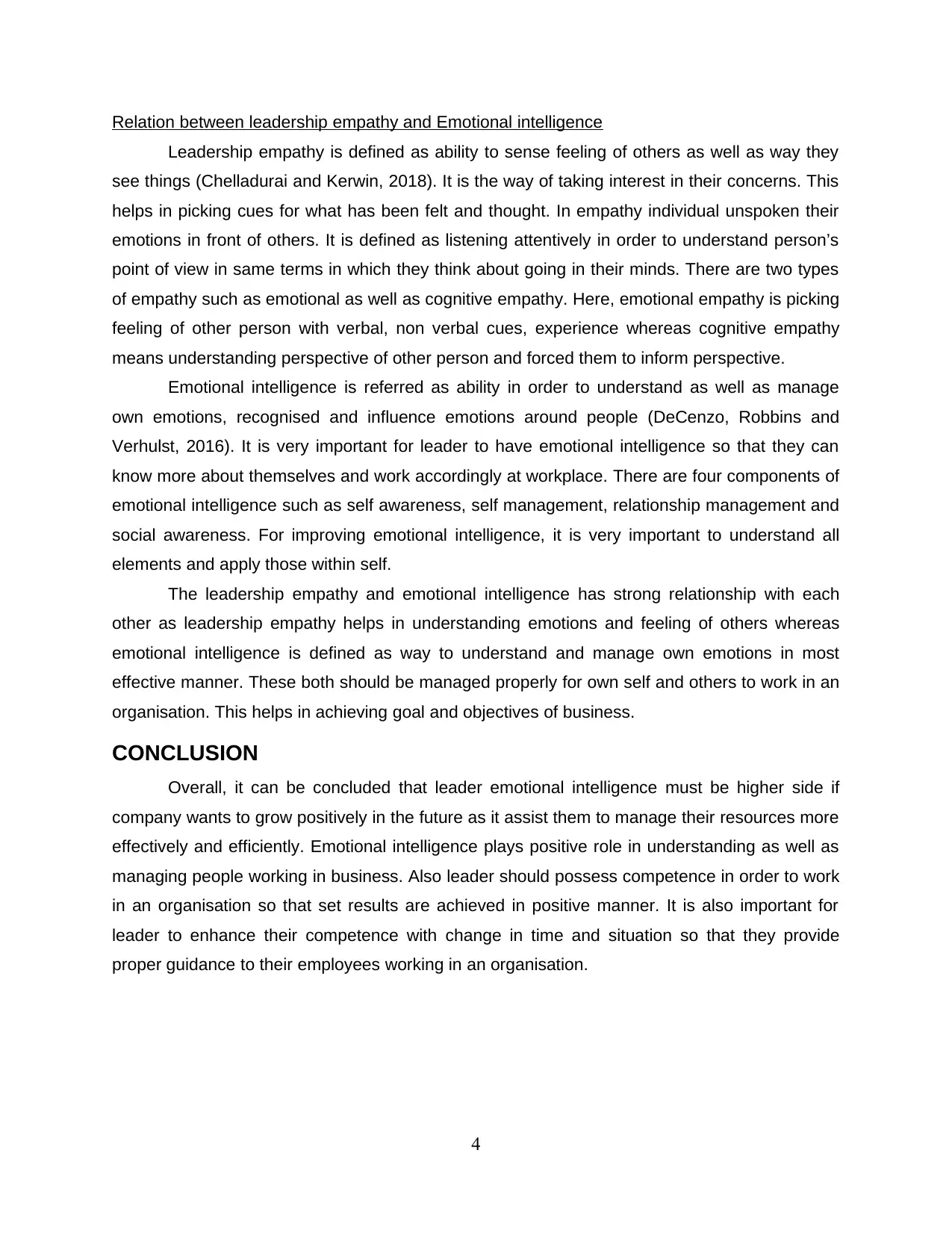
Relation between leadership empathy and Emotional intelligence
Leadership empathy is defined as ability to sense feeling of others as well as way they
see things (Chelladurai and Kerwin, 2018). It is the way of taking interest in their concerns. This
helps in picking cues for what has been felt and thought. In empathy individual unspoken their
emotions in front of others. It is defined as listening attentively in order to understand person’s
point of view in same terms in which they think about going in their minds. There are two types
of empathy such as emotional as well as cognitive empathy. Here, emotional empathy is picking
feeling of other person with verbal, non verbal cues, experience whereas cognitive empathy
means understanding perspective of other person and forced them to inform perspective.
Emotional intelligence is referred as ability in order to understand as well as manage
own emotions, recognised and influence emotions around people (DeCenzo, Robbins and
Verhulst, 2016). It is very important for leader to have emotional intelligence so that they can
know more about themselves and work accordingly at workplace. There are four components of
emotional intelligence such as self awareness, self management, relationship management and
social awareness. For improving emotional intelligence, it is very important to understand all
elements and apply those within self.
The leadership empathy and emotional intelligence has strong relationship with each
other as leadership empathy helps in understanding emotions and feeling of others whereas
emotional intelligence is defined as way to understand and manage own emotions in most
effective manner. These both should be managed properly for own self and others to work in an
organisation. This helps in achieving goal and objectives of business.
CONCLUSION
Overall, it can be concluded that leader emotional intelligence must be higher side if
company wants to grow positively in the future as it assist them to manage their resources more
effectively and efficiently. Emotional intelligence plays positive role in understanding as well as
managing people working in business. Also leader should possess competence in order to work
in an organisation so that set results are achieved in positive manner. It is also important for
leader to enhance their competence with change in time and situation so that they provide
proper guidance to their employees working in an organisation.
4
Leadership empathy is defined as ability to sense feeling of others as well as way they
see things (Chelladurai and Kerwin, 2018). It is the way of taking interest in their concerns. This
helps in picking cues for what has been felt and thought. In empathy individual unspoken their
emotions in front of others. It is defined as listening attentively in order to understand person’s
point of view in same terms in which they think about going in their minds. There are two types
of empathy such as emotional as well as cognitive empathy. Here, emotional empathy is picking
feeling of other person with verbal, non verbal cues, experience whereas cognitive empathy
means understanding perspective of other person and forced them to inform perspective.
Emotional intelligence is referred as ability in order to understand as well as manage
own emotions, recognised and influence emotions around people (DeCenzo, Robbins and
Verhulst, 2016). It is very important for leader to have emotional intelligence so that they can
know more about themselves and work accordingly at workplace. There are four components of
emotional intelligence such as self awareness, self management, relationship management and
social awareness. For improving emotional intelligence, it is very important to understand all
elements and apply those within self.
The leadership empathy and emotional intelligence has strong relationship with each
other as leadership empathy helps in understanding emotions and feeling of others whereas
emotional intelligence is defined as way to understand and manage own emotions in most
effective manner. These both should be managed properly for own self and others to work in an
organisation. This helps in achieving goal and objectives of business.
CONCLUSION
Overall, it can be concluded that leader emotional intelligence must be higher side if
company wants to grow positively in the future as it assist them to manage their resources more
effectively and efficiently. Emotional intelligence plays positive role in understanding as well as
managing people working in business. Also leader should possess competence in order to work
in an organisation so that set results are achieved in positive manner. It is also important for
leader to enhance their competence with change in time and situation so that they provide
proper guidance to their employees working in an organisation.
4
Paraphrase This Document
Need a fresh take? Get an instant paraphrase of this document with our AI Paraphraser
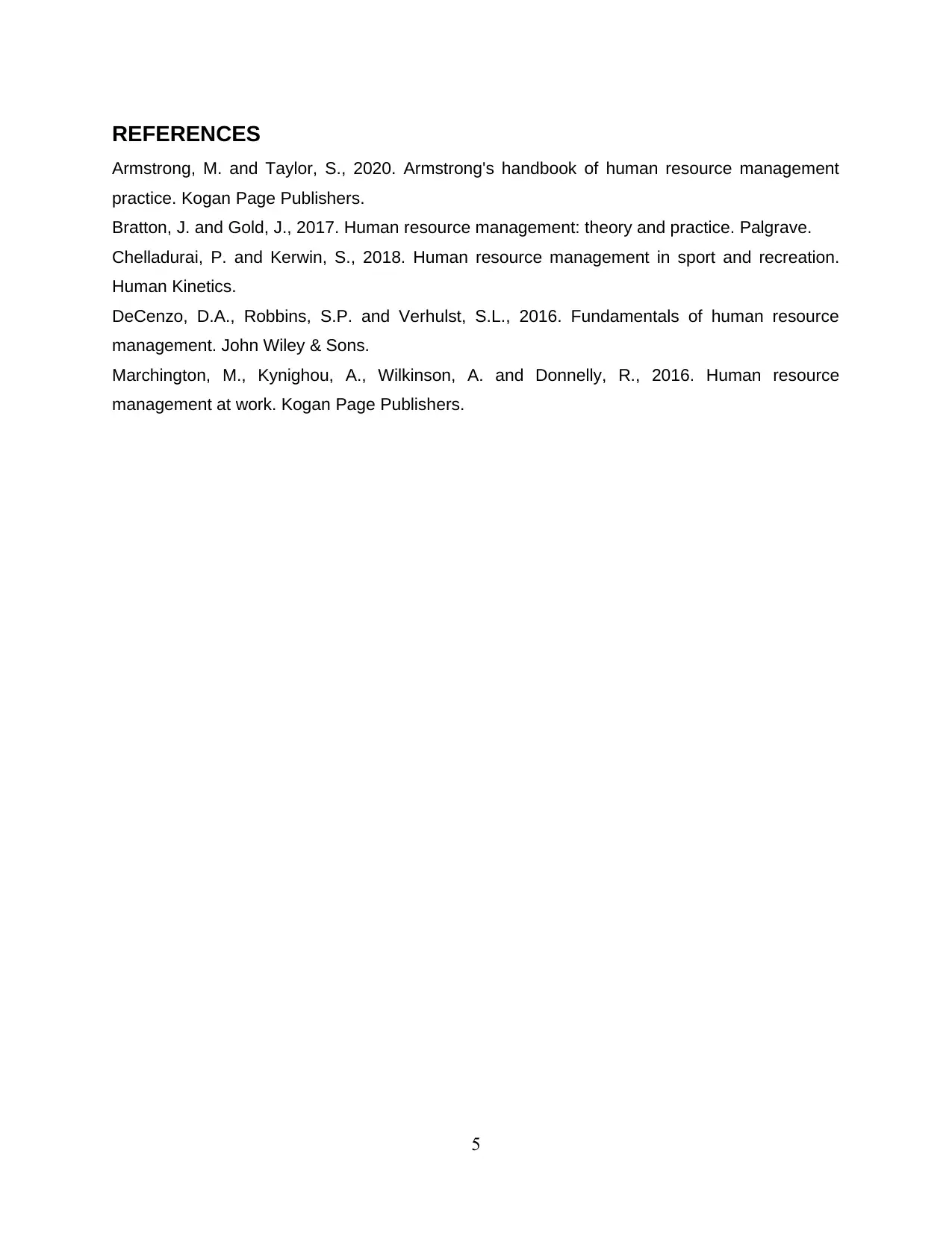
REFERENCES
Armstrong, M. and Taylor, S., 2020. Armstrong's handbook of human resource management
practice. Kogan Page Publishers.
Bratton, J. and Gold, J., 2017. Human resource management: theory and practice. Palgrave.
Chelladurai, P. and Kerwin, S., 2018. Human resource management in sport and recreation.
Human Kinetics.
DeCenzo, D.A., Robbins, S.P. and Verhulst, S.L., 2016. Fundamentals of human resource
management. John Wiley & Sons.
Marchington, M., Kynighou, A., Wilkinson, A. and Donnelly, R., 2016. Human resource
management at work. Kogan Page Publishers.
5
Armstrong, M. and Taylor, S., 2020. Armstrong's handbook of human resource management
practice. Kogan Page Publishers.
Bratton, J. and Gold, J., 2017. Human resource management: theory and practice. Palgrave.
Chelladurai, P. and Kerwin, S., 2018. Human resource management in sport and recreation.
Human Kinetics.
DeCenzo, D.A., Robbins, S.P. and Verhulst, S.L., 2016. Fundamentals of human resource
management. John Wiley & Sons.
Marchington, M., Kynighou, A., Wilkinson, A. and Donnelly, R., 2016. Human resource
management at work. Kogan Page Publishers.
5
1 out of 5
Related Documents
Your All-in-One AI-Powered Toolkit for Academic Success.
+13062052269
info@desklib.com
Available 24*7 on WhatsApp / Email
![[object Object]](/_next/static/media/star-bottom.7253800d.svg)
Unlock your academic potential
Copyright © 2020–2025 A2Z Services. All Rights Reserved. Developed and managed by ZUCOL.





